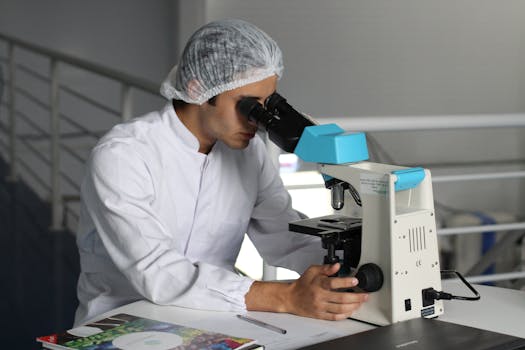Breakthroughs in Medical Technology
Advancements in medical technology have revolutionized healthcare, improving patient outcomes and transforming the way medical professionals diagnose and treat various conditions. From robotic surgery to personalized medicine, these breakthroughs are reshaping the medical landscape, offering new hope and possibilities for patients around the world.

This article explores some of the most significant developments in medical technology, highlighting their impact on healthcare delivery and patient care.
Robotic Surgery
Robotic surgery has become a cornerstone of modern surgical practices, allowing for greater precision and less invasive procedures. Surgeons use robotic systems like the Da Vinci Surgical System to perform complex surgeries with enhanced accuracy. These systems offer high-definition 3D vision and tiny instruments that mimic human hand movements but with greater dexterity.
Patients benefit from reduced recovery times, minimal scarring, and lower risk of complications compared to traditional open surgery. According to the National Institutes of Health (nih.gov), robotic-assisted surgeries have shown significant improvements in patient outcomes, particularly in urology, gynecology, and cardiothoracic procedures.
A study published in the Journal of Clinical Oncology found that robotic surgery for prostate cancer resulted in fewer complications and shorter hospital stays compared to conventional methods (ascopubs.org).
Telemedicine
The rise of telemedicine has transformed how patients access healthcare services. By leveraging digital communication tools, telemedicine allows patients to consult with healthcare providers remotely. This approach is particularly beneficial for individuals living in rural or underserved areas where access to specialized care may be limited.
Telemedicine platforms offer video consultations, remote monitoring, and electronic prescriptions. This technology has proven invaluable during the COVID-19 pandemic, enabling continuous care while minimizing the risk of virus transmission. A report by McKinsey & Company highlights a 38-fold increase in telehealth utilization since the pandemic began (mckinsey.com).
Additionally, telemedicine has shown promise in managing chronic conditions such as diabetes and hypertension. Remote monitoring devices can track patients' vital signs and send real-time data to healthcare providers, facilitating timely interventions and personalized treatment plans.
Personalized Medicine
Personalized medicine is an emerging field that tailors medical treatment to an individual's genetic makeup, lifestyle, and environmental factors. By analyzing a patient's genetic information, healthcare providers can predict disease risks and customize therapies to achieve better outcomes.
This approach has been particularly effective in oncology, where targeted therapies based on genetic mutations have shown remarkable success. For instance, HER2-positive breast cancer patients can benefit from drugs like Herceptin that specifically target the HER2 protein.
A study published in Nature Medicine found that personalized cancer treatments significantly improved survival rates compared to standard chemotherapy (nature.com). The potential of personalized medicine extends beyond oncology, with applications in cardiovascular diseases, neurological disorders, and infectious diseases.
Wearable Health Devices
Wearable health devices have gained popularity for their ability to monitor various health metrics continuously. Devices like smartwatches and fitness trackers can measure heart rate, sleep patterns, physical activity, and even detect irregularities such as atrial fibrillation.
The integration of wearable devices with mobile health apps allows users to track their health data over time and share it with healthcare providers. This real-time monitoring can lead to early detection of potential health issues and proactive management of chronic conditions.
A study by the American Heart Association found that wearable devices could improve physical activity levels and support weight loss efforts (ahajournals.org). Additionally, these devices play a crucial role in preventive healthcare by encouraging healthy lifestyle choices.
Artificial Intelligence in Healthcare
Artificial Intelligence (AI) is making significant strides in healthcare by enhancing diagnostic accuracy, streamlining administrative tasks, and personalizing patient care. AI algorithms can analyze vast amounts of medical data quickly, identifying patterns that might be missed by human clinicians.
In radiology, AI-powered imaging tools assist radiologists in detecting abnormalities such as tumors or fractures with higher precision. A study published in The Lancet Digital Health reported that AI algorithms achieved diagnostic accuracy comparable to experienced radiologists (thelancet.com).
AI also plays a vital role in drug discovery by predicting how different compounds will interact with biological targets. This accelerates the development of new medications and reduces research costs.
| Technology | Applications | Benefits |
|---|---|---|
| Robotic Surgery | Urology, Gynecology, Cardiothoracic Surgery | Precision, Reduced Recovery Time |
| Telemedicine | Remote Consultations, Chronic Disease Management | Accessibility, Continuity of Care |
| Personalized Medicine | Cancer Treatment, Cardiovascular Diseases | Customized Therapies, Improved Outcomes |
| Wearable Health Devices | Fitness Tracking, Chronic Disease Monitoring | Real-Time Data, Preventive Care |
| Artificial Intelligence | Diagnostic Imaging, Drug Discovery | Efficiency, Accuracy |
The advancements in medical technology discussed here demonstrate a promising future for healthcare. Robotic surgery offers unparalleled precision; telemedicine expands access to essential services; personalized medicine provides tailored treatments; wearable devices promote preventive care; and AI enhances diagnostic capabilities.
The integration of these technologies into everyday medical practice continues to evolve rapidly. As these innovations become more accessible and refined, they promise not only to improve patient outcomes but also to make healthcare more efficient and personalized. The ongoing research and development in this field hold immense potential for further breakthroughs that will undoubtedly shape the future of medicine.